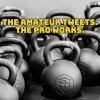WhatWouldHulkDo
Level 8 Valued Member
I would go so far as to argue that genetic potential is by far the most distinguishing characteristic between pros and amateurs. Despite what the motivational posters say, yes, you do have a limit. I've seen plenty of guys who "stuck to the program," did what a good coach told them, had all the motivation and toughness in the world... and still get dominated by a more physically-gifted specimen.
And as far as motivation goes... which actually takes more motivation; pursuing your limits when you have the very real prospect of achieving tremendous wealth and world-wide glory? Or pursuing your limits when the best you can hope for is an occasional moment of glory that perhaps you will be the only witness for? Not to say that the pros aren't actually motivated, but I don't think they're superhuman in this regard - I think a great many amateur athletes deserve the same admiration for their motivation.
As far as "training like the pros"... you have to treat them collectively. Training like any one particular pro is not likely to make you perform like that one particular pro, unless you happen to be similarly gifted. Instead, we look for trends among them, the things that they all do... and try to emulate those things within the scope of our own capabilities.
And as far as motivation goes... which actually takes more motivation; pursuing your limits when you have the very real prospect of achieving tremendous wealth and world-wide glory? Or pursuing your limits when the best you can hope for is an occasional moment of glory that perhaps you will be the only witness for? Not to say that the pros aren't actually motivated, but I don't think they're superhuman in this regard - I think a great many amateur athletes deserve the same admiration for their motivation.
As far as "training like the pros"... you have to treat them collectively. Training like any one particular pro is not likely to make you perform like that one particular pro, unless you happen to be similarly gifted. Instead, we look for trends among them, the things that they all do... and try to emulate those things within the scope of our own capabilities.


